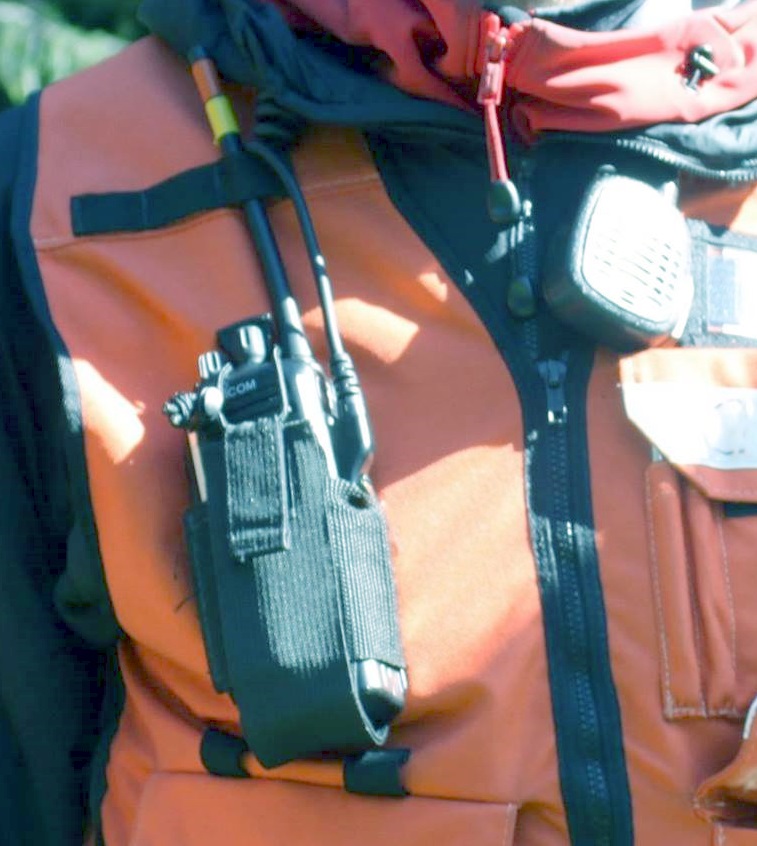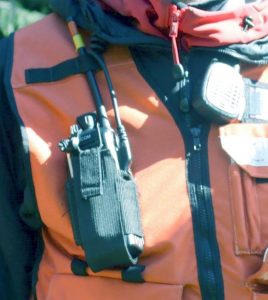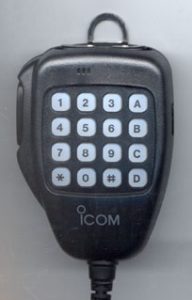Distracted Driving and SAR

The penalty for distracted driving in BC is now $543. It tripled on June 1st, 2016.
The thing you may not know is that using a hand held radio is considered to be the same as using a cell phone under this legislation. Since my SAR group issues radios to all team members, which we regularly use to coordinate while responding to a task, this is of particular concern to me. I thought that I’d highlight the issue to the SAR community at large.
Legal Stuff
While it may not be clear from reading the legal jargon, in this PDF published by RoadSafetyBC indicates that a “hand microphone” is legal under the following circumstances
- Half duplex, push to talk
- within easy reach of driver
- attached to radio that is
- affixed to the vehicle
- attached to the body
The part of the legislation this part of the PDF is based on is as follows
A person may use a hand microphone while driving or operating a motor vehicle on a highway if
(a) the device is within easy reach of the driver’s seat, and
(b) is securely fixed to the motor vehicle or worn securely on the person’s body in a manner that does not obstruct the person’s view of the front or sides of the motor vehicle or interfere with the safety or operating equipment of the motor vehicle.

Confusion Reigns
Needless to say there is a huge amount of confusion in the SAR community about this, and I’m hearing a lot of different things through various channels. I attended a meeting of the amateur radio group CARESS (Coquitlam Amateur Radio Emergency Services Society) the other night and heard of amateurs being ticketed for using a microphone that has buttons on it that allow you to change the channel and access other radio functions.

The reason for this is that some police agencies have issued guidance that includes a photo of a hand mic instead of a hand held radio. Under the guidance and training that some police receive, they will consider any use of a radio that looks like the above photo (not a radio of course) to be illegal.
Exemptions for Emergency Use?
No. As far as we can tell, there are no exemptions for Search and Rescue or any other emergency responders other than those mentioned in section 214.3 of the motor vehicle act
214.3 Section 214.2 does not apply to the following persons who use an electronic device while carrying out their powers, duties or functions:
(a) a peace officer;
(b) a person driving or operating an ambulance as defined in the Emergency Health Services Act ;
(c) fire services personnel as defined in the Fire Services Act .
This is where it would be great if some large governing body, say some kind of Search and Rescue Association that represented most of the ground SAR units in BC, would seek to clarify the legal stuff, and perhaps get an exception in place for SAR personnel.
Recommendations
My personal advice to SAR members is as follows:
- Print this part of the BC Motor Vehicle Act and highlight section 214.3
- DO NOT use a hand held radio while driving unless
- you have a remote mic and
- you strap the radio to your chest with a chest harness or
- attach it to your dash
- For regular use, an installed mobile radio with remote mic is the best option
If you are pulled over rely on the good will toward SAR members, be polite, and explain to the officer you’re complying with the regulation under section 214.3.
Updates
Perhaps not so coincidentally , the a message from the director of the Radio Amateurs of Canada has been circulating which does a much better job of highlighting this issue. What’s more, they’re actively pursuing a solution! Please read:
RAC DIRECTOR COMMENTS ON BC DISTRACTED DRIVING LAW CHANGES.. https://t.co/RVJCLmj2H8 via @VA7MPG
— VA7MPG (@VA7MPG) June 1, 2016

Interesting post!
In Alberta the Traffic Safety Act,http://www.transportation.alberta.ca/distracteddriving.htm , states the following…
“Activities that are not specifically restricted under the law are:…
…*using two-way radios or hand-held radios (also known as CB radios) when a driver is required to remain in contact with one’s employer, such as when escorting oversized vehicles or when participating in search, rescue and emergency management situations…”
It is interesting that Alberta has a different stance on distracted driving legislation than BC, we typically follow you guys!
Hi Michael,
I agree with pretty much everything you said. Thought it would be worthwhile to flush a few things out. I am a lawyer, but this is not legal advice.
For reference, I’m using the Motor Vehicle Act (the “Act”) (http://www.bclaws.ca/civix/document/id/complete/statreg/96318_00), the Use of Electronic Devices While Driving Regulation (the “Regulation”) (http://www.bclaws.ca/civix/document/id/complete/statreg/308_2009) and the Road Safety BC PDF (the “PDF”) (http://www2.gov.bc.ca/assets/gov/driving-and-transportation/driving/publications/electronic-devices-while-driving.pdf)
Do our SAR radio calls while driving get captured under the electronic devices / distracted driving prohibition?
Section 214.1 of the Act defines an “electronic device” as 1) a handheld cellular telephone (or other hand held electronic device that includes a telephone function), 2) a handheld electronic device that is capable of transmitting or receiving electronic mail or other text-based messages, or 3) a prescribed class or type of electronic device.
I think it’s fair to say that neither a portable or mobile SAR radio falls under definition 1 or 2. What about 3?
Section 3(1) of the Regulation sets out the electronic devices that are prescribed for the purposes of S.214.1 of the Act. Included in that prescription are “hand microphones”. (The rest of the prescriptions – electronic devices that include a hands free telephone function, GPS, hand held audio players, and televisions – do not apply for our purposes.) “Hand microphones” are in turn defined by s.3(2) of the Regulation to be a communication device consisting of a hand held unit that a) is both receiver and microphone, is operated by a push and hold to talk function, and allows for oral communication but not for the transmission and receipt of oral communication at the same time.
I think it’s fair to say that both portable and mobile SAR radios fall under the definition of “hand microphone”. They are therefore prescribed for the purposes of s.214.1 of the Act and are therefore considered to be “electronic devices”.
Section 2.14.2 of the Act prohibits a person from using an electronic device while driving or operating a motor vehicle on a highway. (As an aside, “highway” has a specific definition in the Act. It does not include a forest service road – see the definition of “highway” and “industrial road” in s.1 of the Act.)
So, generally, people are not permitted to use an electronic device – which includes our SAR radios – while driving. Are there any exceptions that would allow SAR members responding to a call get around this general prohibition?
As you note, there is an exception in s.214.3 of the Act, but this section does not apply to SAR. (It says that the prohibition doesn’t apply to a peace officer, ambulance driver, or fire services personnel while they are carrying out their duties.)
There is another exception in s.214.4 that may be of some use, depending on how technical you want to get. S.214.4(a) says that s.214.2 (i.e. the prohibition) does not apply to a person who uses an electronic device “to call or send a message to a police force… about an emergency”. On the service that appears to have little application to SAR… but on a SAR call is a police officer from the governing jurisdiction technically the Incident Commander per ICS and our EMBC policy, so when we are calling into Command (and we’re always calling into command per Directed Net protocols) are we not, in a way, communicating with a police officer? (Note, I’m assuming that a SAR response for a missing/lost person would be considered an “emergency”, but haven’t bothered to track that definition down.)
I admit, a weak argument, but I suppose one that could be tried in an attempt to fight a ticket in Court.
Are there any other exceptions that would help SAR members? This is where the difference between portable and mobile radios comes into play.
Section 9 of the Regulation says that a person can use a hand microphone (recall this would include our SAR radios) while driving if: 1) the device is within easy reach of the drivers seat, and 2) is securely fixed to the motor vehicle or worn securely on the person’s body in a manner that does not obstruct their view of the front/sides of the vehicle.
Our mobile radios are definitely securely fixed to our vehicles, so it would appear that SAR use of mobile radios while driving is not supposed to fall under the distracted driving laws.
What about our portable radios? I agree with what you have stated – for their use to be ok (from an electronic device/distracted driving point of view), they would have to be securely worn on our body. Practically, that means in our chest packs. (Further, I assume it means that we could not take the radios out of our chest packs to use/talk – we would have to keep them worn in the pack while using them in the car.) I note that the PDF in fact has a picture of a VHF radio worn in a chest pack to illustrate this as an acceptable practice.
So that’s what the law looks like. Mobiles ok, portables ok if securely worn on person.
As you note though, that’s not the end of the story. What the law may say (or at least how we are interpreting it) may not carry the day, at least on the road when pulled over. Police officers may be misinformed (or, hey, we might be incorrect too) about how this law is to be applied. I’d imagine they would encounter far far less VHF radios than cell phones during their enforcement duties. As you note above, there seems to be some confusion among some police re mobile radios with hand mics with buttons. I gather from your post that some police agencies have been using confusing pictures to provide guidance to their members.
At the end of the day, if an officer wants to ticket you, they will ticket you. You can patiently and professionally and politely try to explain all of the above… hopefully they will accept it, but if they don’t, you’ll get a ticket and you’ll have to decide whether to fight it. (As a lawyer and SAR member, I’d like to hear from any SAR members who have received tickets while using their radios in the (proper) manner I have described above.)
Again, this is not legal advice.
-Ryan
Ryan thanks for taking the time to write such a detailed response, and especially for your non legal advice, but salient insight!
Ultimately it comes down to clarification for SAR – I’m a big fan of the legislation as I’ve see far too many near tragic situations where people are using cell phones. I’d like SAR people to be confident on what they’re allowed to do, and to adapt to that.
Since writing this post I received some communications from the Radio Amateurs of Canada telling me that their organization has held meetings on several levels also seeking clarity in the act. The way government moves (slowly) we can’t expect changes any time soon.
For now we can hope that by highlighting this situation we’ve saved someone a fine.